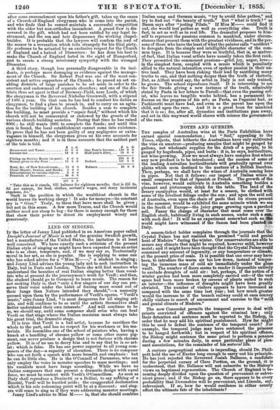LIND ON SINGING.
IF the letter of Jenny Lind published in an American paper called i
Dwight's Journal of Music is not of the genuine Swedish growth, but a manufacture of the United States, the imitation is at least well conceived. We have exactly such a criticism of the present Milan style of singing as might have been expected from an artist who is as clear, temperate, and, if we may say so, Teutonically moral in her art, as she is popular. She is replying to some one who has asked advice for a "Miss M—," a student in singing; and Jenny Lind advises the young lady not to seek instruction in Italy, but in Paris and London. There she will find masters who understand the beauties of real Italian singing better than vocal- ists who at present do the journeyman's work for Verdi; and then, the student should go to Germany to learn music. The reason for not seeking Italy is, that "only a few singers of our day can pre- serve their voice under the habit of forcing more sound out of their lungs than Nature intended they should,"—a necessity pressed upon them by the performance of Verdi's operas. " Verdi's music," says Jenny Lind, "is most dangerous for all singing art- ists, and will continue to be so until the artists themselves shall better understand their own interests." And will continue to be so, we should say, until some composer shall arise who can beat Verdi on that stage where the Italian musician must always take his great trial, the dramatic stage.
It is true that Verdi is a bad artist, because he sacrifices the whole to the part, and has no respect for his workmen or his ma- terials. He resembles one of the school of painters who, having a knack at a handling of chrome yellow or some other coarse pig- ment, can never produce a design that is not furious with chrome yellow. It is of no use to decry him and to say that he is no art- ist; which is false. He has one power superior to all young com- posers of the day—a capacity of elocution. There is no composer who can set forth a speech with more breadth and emphasis : but be can do little else. He is the O'Connell of Parnassus, who can only employ the voice in monster speeches to mass meetings; and his vocalists must have lungs according. While we have no Italian composers that can present a dramatic design with equal force, we must be content with Verdi's O'Connellism. As soon as Italy shall reproduce a Donizetti or a Bellini, to say nothing of a Rossini, Verdi will be hustled aside; the exaggerated declamation which is his sole redeeming point will be at a discount; and sing- ers will cease to sing as if they were addressing monster meetings.
Jenny Lind's advice to Miss M-- is, that she should combine Italian song and German music, "try to avoid false pathos," and try to find out " the beauty of truth." But " what is truth ?" as Bacon says after "jesting Pilate." If Miss M— could find it out, she would test pathos as well as everything else. Truth is fact, in art as well as in real life. The dramatist proposes to him- self to represent the passions common to mankind, under circum- stances that present them with the greatest vividness, and in the per- sons of those who have the least of what the painter calls " accident " to derogate from the simple and intelligible character of the com- mon type. It is because they were so truthful, that is, so matter- of-fact, that Italian vocal artists have usually taken the first rank. They presented the commonest passions—grief, joy, anger, love— in the simplest form, coupled with a music which is peculiarly allied to the natural intonation even of spoken passion in their na- tive land. They have been risking their lead by sacrificing many truths to one, and that nothing deeper than the truth of rhetoric. But, as Alfieri would say, the artist in Italy is not only trained, he grows. The school reproduces itself. It is interesting to see the fair Swede giving a new instance of the truth, admirably stated by Pasta in her letters to ParOdi—that even the passing art- ist, who leaves no tangible works behind, has a permanent in- fluence on the progress of his art ; as Pasta, as Paganini had, as Pachierotti must have had, and even as the parent has upon the child, and upon the race. And it is a great boon for mankind that it is so ; for, after all, dynasties and institutions pass away, and art in this wayward world shares with science the government of the race.


























 Previous page
Previous page